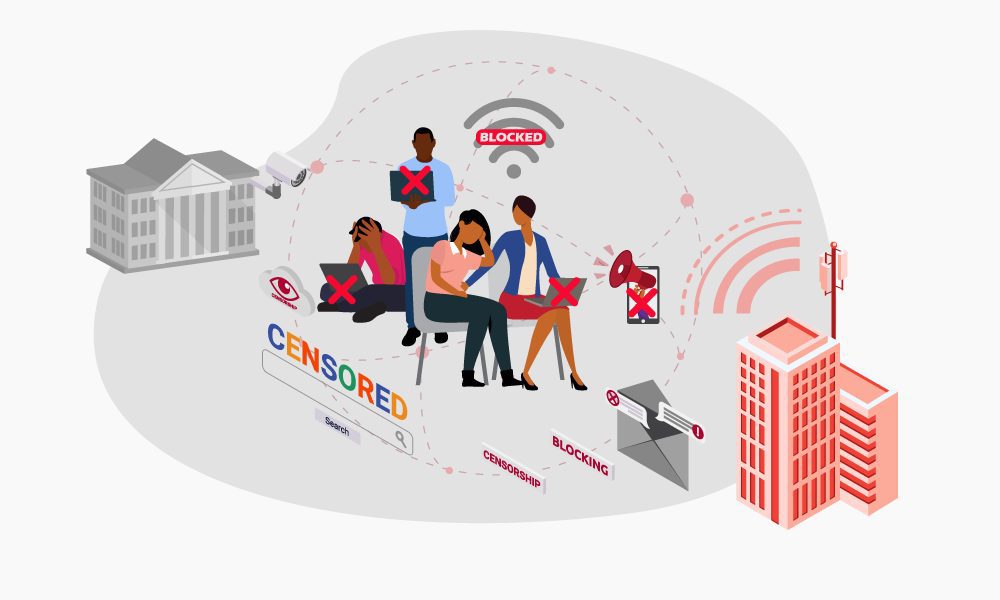$261M Lost, 132M Users Blocked: Africa’s Internet Blackouts Get Costlier

Government-enforced internet blackouts led to USD 261 M in economic losses across sub-Saharan Africa in 2022 affecting 132.2 million people, reveals a new report by Top10VPN, a London-based VPN review firm that assesses internet privacy, security, and freedom.
Continuing the worrying trends witnessed in recent years, various forms of internet blockades were implemented to varying degrees across the region last year, with Ethiopia taking the biggest hit in terms of losses which amounted to USD 146 M, triggered by the internet blackout enforced in the war-torn Tigray region affecting over 1 million internet users.
Ethiopia has been in the midst of violent conflict since 2020, leading to the loss of lives and mass displacement of people, as well as the cutting off of public infrastructure with internet connectivity being blanketed across the country for years on end. In 2022, Ethiopia lost USD 100 M to an internet outage and that figure climbed to USD 164 M the following year, impacting more than 20 million users.
In the latest report, Top10VPN, which champions fierce opposition to internet censorship and governments withholding access to the internet as a form of social control, says it calculates the total economic impact of every major deliberate internet outage and social media shutdown around the world using the COST tool.
The COST tool was developed by internet monitoring NGO Netblocks. It is based on indicators from the World Bank, ITU, Eurostat and US Census. Across the globe, internet shutdowns caused USD 23.79 B in economic losses in 2022 (up 323 percent from 2021), per their calculations, with 114 major deliberate outages in 23 countries affecting 710 million people. And sub-Saharan African region featured quite a bit.
In Africa’s largest economy and most populous nation, Nigeria, where a staggering USD 1.45 B was torched following a ban on Twitter access in 2021 which would ultimately last 7 months, losses of USD 82.7 M were recorded last year, per the research, tied to 287 hours of social media shutdown in 2022.
In another case on the African continent, four million people were affected as Burkina Faso saw USD 12.6 M in losses after shutting down the internet for a total of 380 hours last year over a period of unrest sparked by a failed military coup and subsequent army takeover of the country’s leadership. A similar scenario also played out in Sudan where Top10VPN recorded USD 17.8 M in losses tied to internet shutdowns aimed at stifling pro-democracy protests in the aftermath of a military coup last October.
Furthermore, authorities in Zimbabwe throttled internet speeds and cut internet access during opposition party rallies last year, according to the report. An estimated 5 million people were affected and USD 1.6 M was lost across two such cases in the weeks leading up to crucial parliamentary by-elections in the country.
While conflicts, protests, coups, and political repression are typically connected to the motivations behind most internet outages in Africa, Algeria offered something of a radical exception when Facebook was blocked off in the country for 20 hours during an exam, while also going on to execute a four-hour internet outage last June – all of which affected 25 million people and cost USD 8 M in economic losses.
Sierra Leone and Somaliland also lost USD 2.6 M and USD 1.2 M respectively to internet blockades last year, per the calculations, deepening fears of a worsening propensity of governments to routinely take away internet access at the cost of crippling systems, stifling businesses, trampling upon human/digital rights, and blocking efforts by rights groups to use internet/social media to document evidence of oppression and misdeeds.
Featured Image Credits: Digital Human Rights Lab